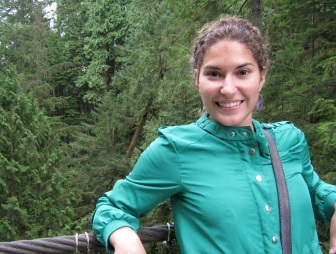Freshly Minted – Stephanie Pegg
September 23, 2014
LIT Student, Algonquin College
 Which information studies program are you attending?
Which information studies program are you attending?
I am in my second year of the Library and Information Technician program at Algonquin College in Ottawa.
What are your current classes like? Which is your favorite so far, and why?
My classes are very hands on and practical. There is so much information out there that is relevant to the discipline. My program does a very good job of covering all the bases, and trying to meet the needs of a diverse group of students. There is a lot of flexibility when doing assignments, so you can choose to explore topics that interest you most.
I really enjoy our cataloguing classes. We have been learning how to catalogue using both ISBD and RDA standards. It is very interesting to be learning both the “old” and “new” standards while the profession is in the midst of changes—changes that my generation may be spearheading, as many libraries have yet to implement RDA. It is also eye-opening to learn the controversies that surround professional cataloguing as outsourcing becomes more common in libraries.
I also like our Basics of Library Management class. I know I want to manage others one day in my career so I am particularly interested in this. In my experience, one of the most challenging and interesting aspects of the professional world is working beside and beneath others. The task-based nature of a work assignment is only part of the job. I have a feeling I will be jumping from one position to another throughout my career, and being able to recognize and adjust to different management styles will play a large role in my success.
Is there one aspect of the profession that surprises you that you were not expecting when you started the program? What is it?
There have been so many surprises, it is hard to choose. The biggest surprise was how far-reaching the profession is. I did not realize that you can do so much within the information field. I went into the program scared of either not being able to land a job, or of landing a one-dimensional job and feeling stuck afterwards. Neither of these are true at all.
I was also surprised to learn how connected libraries are to the social work field. Before deciding on the LIT program, I considered pursuing a degree in social work. Now I feel like I am hitting both bases because libraries play such a large role in educating communities. For instance, the library plays a role in bridging the digital divide for citizens who cannot access internet or technology. Providing this access is so important for healthy, active communities, especially in a country where government publications are going digital.
What was it that initially drove you to librarianship?
I was one of those young dreamers who liked the atmosphere of libraries from when I was a girl. My mom used to bring me to the library and these moments really stuck with me. I always felt like I was in a safe, healthy place where good things happened. In high school I became fascinated by the idea of the book as a tool for self-discovery, and this is when I began to think about becoming a librarian. I did change my mind a few times between then and now, but low and behold, here I am, and I know that I am in the right place.
If you could work anywhere, and do anything with information, what would your dream job look like?
I would be managing a library in a low income community giving people the tools they need for a successful and healthy education (no matter what that education looks like). I would focus library programs on reducing crime, and increasing education, safe communities, and political involvement. I would also run mental health awareness programs through the library.
If someone were considering going to library school, what would you advise them about?
Two things.
First, I would say make your education your own. Complete every assignment in a way that builds on your personal career interests. If you feel you cannot do this within classes and assignments, look to volunteer outside of class to personalize the experience.
Second, view your classmates as your community, not as your competitors.
What do you think is the most important aspect of being an information professional today?
Imparting information literacy skills to young generations. This is how libraries will beat Google!
Add a new comment